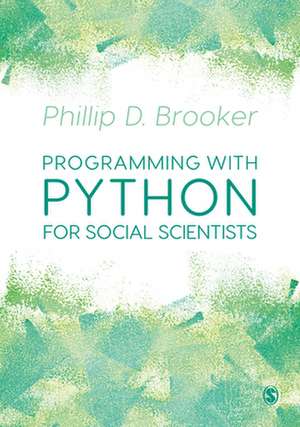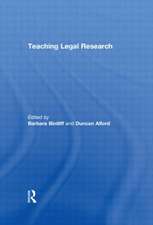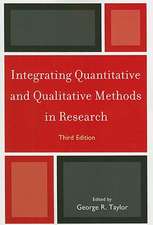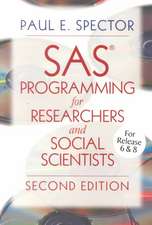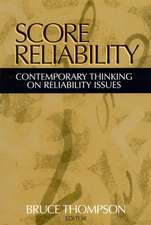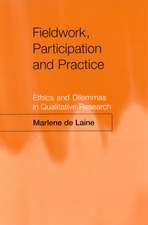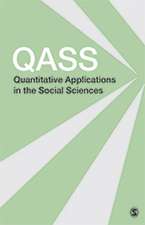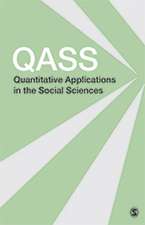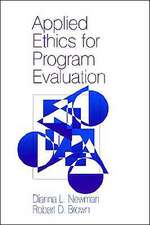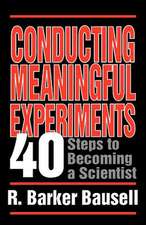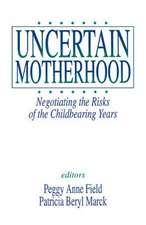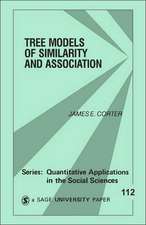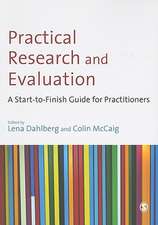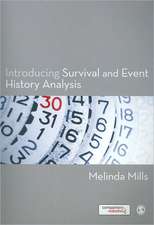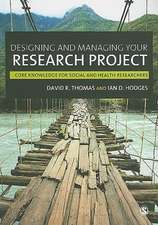Programming with Python for Social Scientists
Autor Phillip Brookeren Limba Engleză Paperback – 23 dec 2019
- the fundamentals of why and how to do your own programming in social scientific research,
- questions of ethics and research design,
- a clear, easy to follow 'how-to' guide to using Python, with a wide array of applications such as data visualisation, social media data research, social network analysis, and more.
| Toate formatele și edițiile | Preț | Express |
|---|---|---|
| Paperback (1) | 395.28 lei 3-5 săpt. | +32.13 lei 6-12 zile |
| SAGE Publications – 23 dec 2019 | 395.28 lei 3-5 săpt. | +32.13 lei 6-12 zile |
| Hardback (1) | 956.87 lei 6-8 săpt. | |
| SAGE Publications – 23 dec 2019 | 956.87 lei 6-8 săpt. |
Preț: 395.28 lei
Nou
Puncte Express: 593
Preț estimativ în valută:
75.63€ • 78.97$ • 62.60£
75.63€ • 78.97$ • 62.60£
Carte disponibilă
Livrare economică 14-28 martie
Livrare express 27 februarie-05 martie pentru 42.12 lei
Preluare comenzi: 021 569.72.76
Specificații
ISBN-13: 9781526431721
ISBN-10: 1526431726
Pagini: 328
Dimensiuni: 170 x 242 x 21 mm
Greutate: 0.61 kg
Ediția:1
Editura: SAGE Publications
Colecția Sage Publications Ltd
Locul publicării:London, United Kingdom
ISBN-10: 1526431726
Pagini: 328
Dimensiuni: 170 x 242 x 21 mm
Greutate: 0.61 kg
Ediția:1
Editura: SAGE Publications
Colecția Sage Publications Ltd
Locul publicării:London, United Kingdom
Recenzii
Great resource for all students and researchers looking for a clear, accessible, yet comprehensive introduction to Python and coding.
This is an engaging, insightful and sophisticated guide to Python for social scientists. It's a manual of the highest quality and a practice led intervention with the potential to shape the future of the digital social sciences. I can't recommend it highly enough.
This is an engaging, insightful and sophisticated guide to Python for social scientists. It's a manual of the highest quality and a practice led intervention with the potential to shape the future of the digital social sciences. I can't recommend it highly enough.
Cuprins
Introduction
Chapter 1.What is Programming? And What Could it Mean for Social Science Research?
Chapter 2. Programming-as-Social-Science (Critical Coding
Chapter 3.Setting Up to Start Coding
Chapter 4.Core Concepts/Objects
Chapter 5.Structuring Objects
Chapter 6.Building Better Code with (Slightly) More Complex Concepts/Objects
Chapter 7.Building New Objects with Classes
Chapter 8.Useful Extra Concepts/Practices
Chapter 9.Designing Research that Features Programming
Chapter 10.Working with Text Files
Chapter 11.Data Collection: Using Social Media APIs
Chapter 12.Data Decoding/Encoding in Popular Formats (CSV, JSON and XML)
Chapter 13.Data Collection: Web Scraping
Chapter 14.Visualising Data
Conclusion: Using Your Programming-as-Social-Science Mindset
Chapter 1.What is Programming? And What Could it Mean for Social Science Research?
Chapter 2. Programming-as-Social-Science (Critical Coding
Chapter 3.Setting Up to Start Coding
Chapter 4.Core Concepts/Objects
Chapter 5.Structuring Objects
Chapter 6.Building Better Code with (Slightly) More Complex Concepts/Objects
Chapter 7.Building New Objects with Classes
Chapter 8.Useful Extra Concepts/Practices
Chapter 9.Designing Research that Features Programming
Chapter 10.Working with Text Files
Chapter 11.Data Collection: Using Social Media APIs
Chapter 12.Data Decoding/Encoding in Popular Formats (CSV, JSON and XML)
Chapter 13.Data Collection: Web Scraping
Chapter 14.Visualising Data
Conclusion: Using Your Programming-as-Social-Science Mindset
Notă biografică
Phillip Brooker is a Senior Lecturer in Sociology at the University of Liverpool, with interdisciplinary research interests in and around ethnomethodology and conversation analysis, science and technology studies, and human-computer interaction. On the platform of a record of research in digital methods and social media analytics, one strand of his current research is the exploration of the potential for computer programming to feature in core social science research methods training (Programming-as-Social-Science, or PaSS); an interest manifest in his recently-published book entitled ¿Programming with Python for Social Scientists¿ (SAGE).
Descriere
Programming with Python for Social Scientists offers a vital foundation to one of the most popular programming tools in computer science, specifically for social science researchers, assuming no prior coding knowledge.
